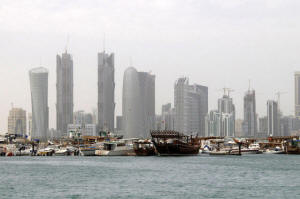|
Feud over Qatar deepens conflicts across
Arab world
 Send a link to a friend
Send a link to a friend
 [June 09, 2017]
By Noah Browning and Aidan Lewis [June 09, 2017]
By Noah Browning and Aidan Lewis
DUBAI/TUNIS (Reuters) - The ostracism of
Qatar by other powerful Arab states is deepening divisions between their
respective allies vying for influence in wars and political struggles
from Libya to Yemen.
The feud complicates efforts to stabilize countries reeling from years
of turmoil and undermines the notion of a Sunni Muslim Arab world united
against terrorism and Iran, proclaimed by U.S. President Donald Trump in
his visit last month.
The quarrel is the latest chapter in the battle of wills between
political Islamists and traditional Arab autocrats which has buffeted
Muslim societies for decades.
Since the 2011 "Arab Spring" protests, which aspired to democratic
reform but in several countries collapsed into warfare, Egypt and
especially the United Arab Emirates emerged as main foes of an ascendant
Muslim Brotherhood backed by Qatar.
After Saudi Arabia, Egypt and the UAE cut ties to Doha on Monday,
accusing it of supporting militants and Iran, regional allies followed
suit and denounced domestic foes as Qatari stooges, undermining
reconciliation efforts by foreign powers.
"The whole situation has become very awkward. Qatar and its big rivals
are fighting each other, but indirectly and on other people's
territory," said Yemeni analyst Farea al-Muslimi.
"Having internal Arab messes like this escalate and get more complicated
makes it pretty clear that the Arab world is far away from solving other
issues like Palestine or Iraq or even the relationship with Iran."

In Libya, the UAE and Qatar, which both played key roles in backing
rebels in the uprising that toppled Muammar Gaddafi in 2011, have
emerged as rivals on the battlefield with conflicting interests and
visions.
The UAE, along with Egypt, has backed anti-Islamist former army
commander Khalifa Haftar, appointed by a government and parliament based
in the east. Qatar and Turkey have supported rival Islamist-leaning
factions in western Libya.
In Yemen -- mired in conflict since Saudi Arabia launched an air war in
2015 against the Houthi movement that controls the capital -- a southern
Yemeni secessionist council armed by the UAE opposes the internationally
recognized government because it includes the Qatar-backed Muslim
Brotherhood.
The council and Yemen's Saudi-backed government, despite years of Qatar
ties, cut diplomatic relations with Doha.
The eastern-based Libyan government and parliament aligned with
anti-Islamist Haftar did the same.
"We are certain that the concerned states in the Gulf and Egypt will put
pressure so as to drastically shift Qatar's outrageous policies,"
Mohamed Dayri, the foreign minister of the eastern government, told
Reuters.
On Friday Saudi Arabia, the UAE, Egypt and Bahrain designated as
terrorists five Libyans including Tripoli Grand Mufti Sadiq al-Ghariani,
an influential figure for anti-Haftar militias in western Libya. They
also listed the Benghazi Defence Brigades (BDB), a group that has tried
to revive armed opposition to Haftar since last year.
TIME TO WITHDRAW?
Qatar has for years punched well above its weight in world affairs by
parleying its vast gas wealth into influence across the region, irking
the UAE and dominant Gulf Arab power Saudi Arabia with its maverick
stances and support for Islamists.
[to top of second column] |

A traditional wooden fishing Dhow is seen in port near modern glass
and steel buildings on the Doha skyline, Qatar February 9, 2010.
REUTERS/Jacky Naegelen/File Photo

Now, Qatar's powerful neighbors appear to be demanding a retreat
from those conflicts.
"The message now is that it's time for Qatar to withdraw from the
region and essentially not have an independent foreign policy," said
Peter Salisbury, an analyst at Chatham House.
"It looks like Saudi Arabia and the UAE won't be satisfied until
Qatar is pushed to stop funding the groups they don't like, the
Muslim Brotherhood and Hamas."
But these demands come while Qatar's allies have for the most part
been forced onto the back foot.
Blessed by Saudi Arabia and the UAE, former Egyptian army chief and
now president Abdel Fattah al-Sisi ousted the Qatar-aligned elected
Islamist president Mohamed Mursi in a 2013 military takeover.
Palestinian Islamist group Hamas, some of its leaders based in Doha,
is no closer to leading the Palestinian people then when it fell out
with secular rivals in the Fatah party in 2007.
The Gulf spat is likely to further fuel inter-rebel conflicts in
Syria, where rivalries between Qatar and Saudi Arabia have been
showcased since the earliest days of the crisis.
"EXTREMIST DIVIDENDS"
Qatar's friends who retain a plausible chance at national
leadership, in Libya and Yemen, may have the most to lose from the
row.
Haftar styles himself as a bane of extremism, and has become the
dominant figure in eastern Libya since launching a campaign against
Islamist groups and former rebels in Benghazi three years ago. Many
suspect he seeks national rule.
His supporters believe the Qatar spat vindicates their anti-Islamist
stance, as Haftar has gained ground and the U.N.-backed Tripoli
government that he has rejected has been floundering.
Any hardening of the Haftar camp's stance could complicate mediation
efforts by Libya's neighbors to the west, Algeria and Tunisia, which
have been pushing for an inclusive, negotiated solution.

"Qatar being made an example out of ... means that Haftar, Egypt and
the UAE will experience much less diplomatic pushback as they ramp
up their military campaign inside Libya itself," said Jalel
Harchaoui, a researcher at Paris 8 University.
(Editing by Samia Nakhoul)
[© 2017 Thomson Reuters. All rights
reserved.]
Copyright 2017 Reuters. All rights reserved. This material may not be published,
broadcast, rewritten or redistributed. |